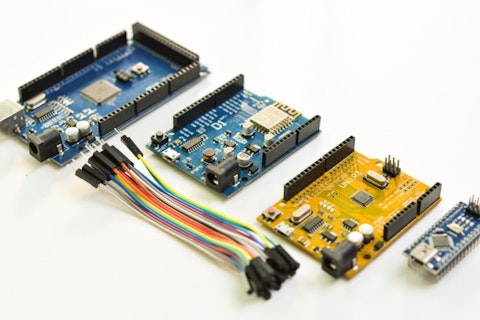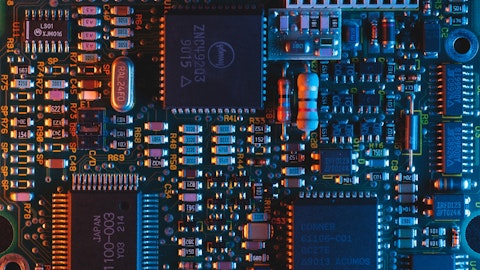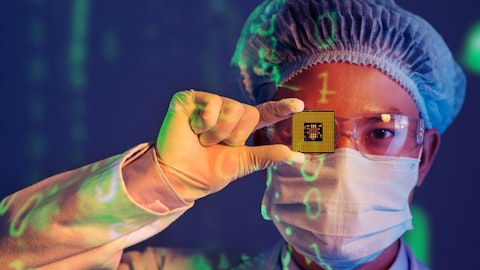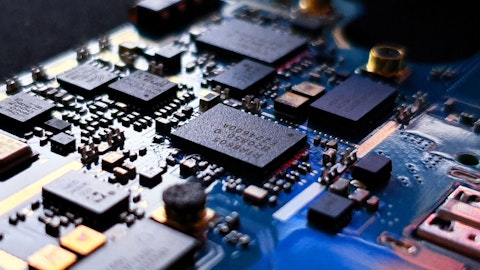SMART Global Holdings, Inc. (NASDAQ:SGH) Q3 2023 Earnings Call Transcript June 29, 2023
SMART Global Holdings, Inc. beats earnings expectations. Reported EPS is $0.66, expectations were $0.4.
Operator: Good afternoon. Thank you for attending today’s SGH Third Quarter Fiscal 2023 Earnings Call. My name is Tana, I’ll be your operator for today’s call. All lines will be muted during the presentation portion of the call, with an opportunity for questions-and-answers at the end. [Operator Instructions] I would now like to turn the conference over to our host, Suzanne Schmidt with Investor Relations. You may go ahead.
Suzanne Schmidt: Thank you, operator. Good afternoon, and thank you for joining us on today’s earnings conference call and webcast to discuss SGH’s third quarter fiscal 2023 results. On the call today are: Mark Adams, Chief Executive Officer; Jack Pacheco, Chief Operating Officer; and Ken Rizvi, Chief Financial Officer. You can find the accompanying slide presentation and press releases for this call on the Investor Relations section of our website. We encourage you to go to the site throughout the quarter for the most current information on the company. I would also like to remind everyone to read the use of forward-looking statements note that is included in the press release and the earnings call presentation. Please note that during this conference call the company will make projections and forward-looking statements, including statements about the company’s growth trajectory and its 2023 financial outlook.
Forward-looking statements are based on current beliefs and assumptions and are not guarantees of future performance and are subject to risks and uncertainties including, without limitation, the risks and uncertainties reflected in the press release and the earnings call presentation filed today, as well as in the company’s most recent annual and quarterly reports. The forward-looking statements are representative only as of the date they are made and except as required by applicable law, we assume no responsibility to publicly update or revise any forward-looking statements. We will also discuss both GAAP and non-GAAP financial measures. Non-GAAP measures should not be considered in isolation from as a substitute for or superior to our GAAP results.
We encourage you to consider all measures when analyzing our performance. A reconciliation of the GAAP to non-GAAP measures is included in today’s press release. And with that, let me turn the call over to Mark Adams, CEO.
Mark Adams: Thanks, Suzanne, and thank you all for joining us today for our fiscal 2023 third quarter call. Over the past three years, we have made tremendous progress on the transformation of SGH. We have grown our top line, increased our gross margins, delivered strong earnings per share, and strengthen our balance sheet by generating positive operating cash flow. Earlier this month, we announced that we had agreed to divest a majority stake in our Brazil consumer memory business, enabling SGH to shift our business towards high performance, high availability solutions for enterprise customers. Although macroeconomic headwinds persist, we believe we are well positioned for long-term success, driven by secular tailwinds in AI, machine learning, and data analytics.
While Ken will review the financials in more detail, I would like to call out some highlights from our third quarter performance. Our team achieved strong results for the third quarter and what remains a very challenging global economic environment. Non-GAAP gross margins was 28%, up 230 basis points from the year ago quarter and non-GAAP diluted earnings per share totaled $0.66 on sales of $383 million. We generated strong cash flow from operations of approximately $41 million in the quarter and exited Q3 with a strong balance sheet, including record cash and cash equivalents of $401 million. Now let me review each of our business lines. Starting with IPS, which is comprised of our Penguin Computing and Stratus Technologies brands. We design, manufacture, deploy, and provide managed services for high performance computing for the data center, the cloud, and the edge.
AI, machine learning, and data analytics are becoming foundational technologies for the success of enterprises across a growing set of industries. We believe that Penguin Computing, which has more than 25-years of experience in the deployment of HPC Systems and Solutions is well positioned at the forefront of the generative AI revolution. Our team has designed built and manage some of the largest and most powerful supercomputers in the world, including managing a total of more than 50,000 NVIDIA GPUs for AI training at scale. Our engagement model is focused on developing tailored solutions for our customers. We architect a system that integrates technologies such as compute, storage and networking that optimize for our customers’ unique HPC and AI workload requirements.
Our Scyld ClusterWare software provides an intelligence suite of management functionality including node provisioning, image customization, and cluster monitoring, while serving as a platform for additional software components. What we believe differentiates Penguin Computing from the competition is our ability to work with our customers from the design phase, through integration, all the way through to implementation and management of large HPC and AI clusters. Additionally, we are able to provide solutions on-premise, in the cloud, and at the edge. In the third quarter, IPS sales totaled $171 million, which represented 45% of total SGH sales, reinforcing the transformation we’re going through. Compared with the year-ago quarter, IPS sales increased by 31% excluding Stratus Technologies and were up 79% by including Stratus.
Our service revenue, the majority of which is generated in IPS represented 15% of total SGH revenue in the third quarter and reflects the incremental value we are providing to our customers. Our services include point-in-time services such as design and implementation, as well as longer-term managed services. During the quarter, we continued to introduce new technologies and capabilities in the market. Penguin announced a new version of its flagship Scyld ClusterWare software platform, which is a powerful management and monitoring tool that empowers customers to expand their own HPC clusters. This new version provides greater scalability, boosts performance, and delivers greater ease-of-use for users. Stratus announced the next-generation of its fault-tolerant computing platforms that enable our customers to run business-critical applications such as transaction and payment processing to industrial automation at the core, in the cloud, and at the edge.

frank-wang-ogxlyCA1BQc-unsplash
During the quarter, Meta announced the completion of the second phase buildout for their AI Research SuperCluster known as RSC. As our implementation partner, Penguin work with Meta to design the AI-optimized infrastructure that powers their RSC, improving the overall cluster management and implement the system. The Navy DoD Supercomputing Resource Center’s newer supercomputer named Nautilus, is a Penguin TrueHPC system featuring 48 GPU nodes. This HPC system, which completed its final testing in April, enables scientists and researchers to use complex applications to unlock weather patterns and ocean modeling, providing predictive insights about the earth’s climate and sustainability. Today, we’re also announcing that Dave Laurello, who joined us as CEO of Stratus at the time of the acquisition, will take on an expanded role as President of IPS, replacing Thierry Pellegrino.
We believe that Dave’s extensive experience building and leading technology teams, while serving Fortune 100 enterprises, will help us scale our customer engagements and overall operations. Prior to Stratus, Dave also worked in executive roles at Lucent and Digital Equipment Corporation. While there is a heightened level of customer engagement with regards to HPC, AI opportunities, we recognize that we are still in the early stages of generative AI and machine learning. As we have noted on prior calls, we expect IPS sales will be lumpy due to the deployment timeline decisions and cycles of large customer installations. Over the long-term, under Dave’s leadership, we believe we’re in a position to capitalize on these emerging market trends. Shifting to Memory, our Memory Solutions Group is currently made up of two businesses: Specialty Memory, which is focused on specialty memory applications in the enterprise; and our Brazil Module business, primarily serving the consumer market.
Overall, third quarter memory revenue came in at $148 million or 39% of total SGH sales and was relatively flat with the second quarter. We have a long history of serving enterprise customers in the networking telecom and industrial end-markets. An area of focus going forward is to leverage this expertise to help drive memory subsystem innovation in AI and machine learning. For example, our CXL offerings removed the performance and latency bottlenecks between GPUs, CPUs, and memory and HPC applications. We are seeing strong design activity and customer interest for our CXL offerings and the wide variety of CXL architectures required by customers plays to our strength. In addition to our development efforts with CXL, we continue to implement leading-edge test processes to ensure high levels of quality and reliability for our enterprise customers.
Our zero failure rate or Zefr memory offering is gaining significant interest among major customers as it meaningfully reduces field failures and helps to maximize system utilization. During the quarter, we started shipping DDR5 Zefr memory modules, which when combined with our DDR4 Zefr memory modules gives SMART Modular a key differentiation and high availability memory products. Our memory business continues to demonstrate relative stability throughout the current memory cycle due to the specialty nature of our value-add business model. In the third quarter, this translated into operating margins of approximately 8% for our memory business. Now turning to our LED Solutions Group, which operates under the Cree LED brand and produces application optimized LEDs for specialty lighting, video screens, gaming displays, horticulture, outdoor and architectural lighting.
For the third quarter of fiscal 2023, LED Solutions totaled $64 million or 17% of overall SGH sales and were up 15% sequentially from what could have been the bottom in the second quarter. While customers are continuing to work down inventory levels, we are seeing customer design activity improving. Typically, as we come through these cycles, we look for this as a precursor to demand improving. And while we are still in early days in the cyclical recovery of the LED market, we are optimistic that the business will have a stronger fiscal 2024. Cree continues to be recognized as a leader in customer-focused innovation. During the third quarter, LED Magazine awarded three of Cree LED’s latest product releases with BrightStar Awards for innovative LED products.
The XLAMP Element G and Pro9 LEDs were recognized in the LED light sources category, while the Photophyll select LEDs were recognized in the horticulture, SSL, and control systems category. By continuing to invest in advanced LED technology, Cree is able to empower its customers with new and innovative LEDs to achieve remarkable system-level solutions. We believe that the combination of industry-leading technology in IP, a capital-light outsourced manufacturing model and disciplined expense control, has positioned Cree well in these challenging times. We are starting to see signs of improving customer demand and expect revenue to be up modestly in the fourth quarter. I’ll stop here and hand it over to Ken for a more detailed review of our third quarter financial performance and our guidance for next quarter.
Ken?
Ken Rizvi: Thanks, Mark. I will focus my remarks on our non-GAAP results, which are reconciled to GAAP in our earnings release tables. Now let me turn to our fiscal third quarter 2023 results. Total SGH revenues were $383 million and non-GAAP gross margins came in at 28% at the midpoint of our guidance. Non-GAAP diluted earnings per share were $0.66 for the third quarter. In the beginning of this fiscal year, we began providing the breakdown of our overall revenue by product and services. As a reminder, our services revenue includes longer-term services, as well as point-in-time services such as logistics and implementation services. In Q3, our overall services revenue totaled $58 million, up from $48 million in the year ago quarter and helped by the inclusion of Stratus, which we acquired in the beginning of this fiscal year.
Product revenues were $326 million. Third quarter revenue by business unit was as follows: IPS was $171 million; memory was $148 million; and LED came in at $64 million. This translates into a sales mix of approximately 45% IPS, 39% memory and 17% LED. Non-GAAP gross margin for SGH in Q3 was 28%, up from 25.7% in the year-ago quarter, driven primarily by IPS. Non-GAAP operating expenses for the third quarter were $70.9 million, down from $72.5 million in the second quarter of 2023. Operating expenses were down from the prior quarter, primarily due to continued cost containment initiatives, as well as lower bonus accruals. Operating expenses benefited in third quarter of 2023 from $0.4 million in financial credits in Brazil, which was down from $1.4 million in the second quarter of 2023 and down from $3.3 million in the year-ago quarter.
This credit is expected to provide minimal benefit in our fourth quarter of 2023. Non-GAAP diluted earnings per share for the third quarter of 2023 was $0.66 per share compared with $0.87 per share in the year-ago quarter. Included in our non-GAAP EPS for the third quarter is a reduction in taxes of approximately $6.5 million or $0.13 per diluted share, as we anticipate using additional prior year net operating losses to offset U.S. taxable income for fiscal 2023, which also has the benefit of reducing our cash taxes for the year. Adjusted EBITDA for the third quarter of 2023 was $45 million or 12% of sales, compared to $64 million or 14% of sales in the year ago quarter. Turning to balance sheet highlights, our working capital, our net accounts receivable totaled $244 million, compared with $229 million last quarter.
Days sales outstanding came in at 42 days, up six days from the last quarter, primarily due to the timing of invoicing and collections for IPS. Inventory totaled $226 million at the end of the third quarter, down from $294 million at the end of the prior quarter. The decrease in inventory was driven primarily by a reduction in IKEA and memory inventories in the third quarter. Inventory turns were 7.6 times in the third quarter versus 6.3 times in the prior quarter. And consistent with past practice, net accounts receivable, days outstanding and inventory turnover are calculated on a gross sales and cost of goods sold basis, which were $526 million and $428 million respectively for the third quarter. As a reminder, the difference between gross and net revenue is related to our logistics services, which is accounted for on an agent basis, meaning that we only recognize the net profit on logistics services as revenue.
Cash and cash equivalents totaled a record $401 million at the end of the third quarter, up $25 million, compared with $376 million at the end of the prior quarter. Third quarter cash flows from operating activities totaled $41 million, compared with $101 million in the prior quarter. And for those of you tracking capital expenditures and depreciation, capital expenditures were $13.3 million in the third quarter and depreciation was $9.5 million. Earlier this month, we announced an agreement to divest the majority stake of SMART Modular Brazil. The 81% divestiture of the commodity module business in Brazil will enable SGH to focus on our strategy of delivering high-performance, high-availability solutions to our enterprise customers. The proposed purchase price values 100% of SMART Brazil and an initial enterprise value of $205 million.
And values are 81% disposition at $166 million. We will receive an upfront cash payment of approximately $138 million, subject to certain customary adjustments and a deferred cash payment of approximately $28 million to be paid 18 months post-closing. The transaction is expected to close by the end of calendar year 2023, subject to regulatory approvals and satisfaction of customary closing conditions. The parties have also agreed to a put-call feature for the remaining 19%, exercisable during three exercise windows between 2027 and 2029. The put-call values 100% of the Brazil business at 7.5 times its fiscal year net income. For example, if the put-call is exercised in 2027, the reference net income would be fiscal 2026 and SGH would receive 19% of such value at the time of and subject to the exercise of the put or call.
For reference, the Brazil business revenue totaled $153 million through the first three quarters of 2023 and approximately $39 million in the third fiscal quarter. Based on current run rates for the business, at closing, we would expect this divestiture to be immediately accretive to our non-GAAP gross margins by over 200 basis points and also neutral to slightly positive to our non-GAAP earnings per share. Now, let me turn to our fourth quarter fiscal 2023 guidance, which includes Brazil. We expect that revenues for the fourth quarter of 2023 will be approximately $375 million at the midpoint plus or minus $25 million. Our guidance for the fourth quarter incorporates the following assumptions. For IPS, which is more project-oriented with variability related to the timing of hardware sales, we expect sequential revenues to be down slightly at the midpoint.
For memory, which includes SMART Brazil, we expect total revenues to be relatively flat sequentially. And for LED, we expect revenues to be up modestly in the fourth quarter. Our GAAP gross margin for the fourth quarter is expected to be approximately 26% at the midpoint plus or minus 1%. Non-GAAP gross margin for the fourth quarter is expected to be approximately 28% at the midpoint, plus or minus 1%. Our non-GAAP operating expenses for the fourth quarter are expected to be approximately $71 million plus or minus $2 million. GAAP diluted earnings per share for the fourth quarter is expected to be approximately $0.02 plus or minus $0.15. And on a non-GAAP basis, excluding share-based compensation expense, intangible asset amortization expense, debt discount and other adjustments, we expect diluted earnings per share will be approximately $0.45, plus or minus $0.15.
Our GAAP diluted share count for the fourth quarter is expected to be approximately 54.5 million shares based on our current stock price. Our non-GAAP diluted share count is expected to be approximately 52.5 million shares as it includes the benefit of our convertible note capped calls. Cash capital expenditures for the fourth quarter are expected to be in the range of $15 million to $20 million. And our non-GAAP taxes for the fourth quarter are expected to be in the 11% range as we get continued benefit from our U.S. net operating loss carryforwards. However, as we look into fiscal 2024, we will have used the majority of our available U.S. tax attributes and our non-GAAP effective tax rate is expected to increase to the low to mid-20% range.
We continue to manage our operations in a prudent manner as we navigate a challenging environment, while also continuing to invest in our long-term growth. Please refer to the non-GAAP financial information section and the reconciliation of GAAP to non-GAAP measures tables in our earnings release for further details. Now let me turn it back over to Mark for a few remarks prior to Q&A.
Mark Adams: Thanks Ken. While we are in the early stages of AI, machine learning and data analytics deployment, we feel SGH is well-positioned to grow over the next three to five years. As such, we continue to transform into a business focused on delivering high-availability, high-performance enterprise solutions that help our customers solve for the future. We are not only benefiting from the right secular tailwinds in terms of end markets, but we have an operating model that has performed well throughout the cycle. The combination of our shift towards enterprise solutions and the secular tailwinds, coupled with this discipline on how we operate the company, make us optimistic about the future and our ability to deliver long-term value to our shareholders. With that operator, we are now ready for Q&A.
See also 15 Hardest Sports in the World Ranked and 16 Best Places to Live in Upstate New York for Families.
Q&A Session
Follow Penguin Solutions Inc. (NASDAQ:PENG)
Follow Penguin Solutions Inc. (NASDAQ:PENG)
Receive real-time insider trading and news alerts
Operator: Certainly. [Operator Instructions] The first question is from the line of Kevin Cassidy with Rosenblatt Securities. You may proceed.
Kevin Cassidy: Hi, excuse me. Thanks for taking my question and congratulations on the great results and good guidance. Maybe, there’s of course lot of questions around the IPS business right now and the interest in AI. Can you say how your RFQ funnel or maybe opportunity funnel has grown, say since the beginning of the year and how are you addressing it? I guess, how are you choosing which customers to pursue?
Mark Adams: Yes, great. Kevin, this is Mark, thanks for the question. Well, needless to say, the level of activity is noticeably on the uptick. And the second part of your question is really an opportunity and a challenge for us because our model is a bit different. We’re looking for customer relationships that really want us from a trusted adviser role and all the way from the beginning of our engagement on designing systems and solutions to implementing them and then managing them post deployment, if you will, post installation. And so, the criteria around how we do it just given the level of activity is really what’s the best fit in terms of a partnership model with the customer and what role we can play. And so that’s how we’re looking at it, because, as you might imagine, if it’s just a hardware play, that’s a game we don’t want to be in and we’re trying to select the type of relationships we engage with to be those that are a little bit more full service oriented.
Kevin Cassidy: And maybe just add on to that, what interest are you seeing from various vertical markets? It’s more than just cloud or are you seeing broad interest?
Mark Adams: Yes, this is — that’s also interesting because it is — it’s really taken off in terms of the vertical kind of expansion, if you will. Certainly, the cloud hyperscalers kind of early to market on some of this and I’ll come back to that in a second, because it’s just not the big names. There’s a — with the class of what I would call Tier 2, Tier 3 cloud providers that are building out data centers for custom type application environments, which is obviously very interesting to us. But I think financial and health care are two that are very interesting for us. Oil and gas continues to be one that’s very interesting to watch. And I’d say, one we continue to take a look at is just education and research, while that was kind of the original market segment for HPC to expand over the years.
AI is taking on a new definition of what that opportunity looks like in terms of science and research and what have you. And so, I know that sounds like a lot, but, I mean, everyone is taking a look at how they can enable AI in their enterprise. So, it’s been an interesting year to watch the horizontal expansion of customer interest.
Kevin Cassidy: Great. Thanks, Mark.
Mark Adams: Thank you.
Operator: Thank you, Mr. Cassidy. Our next question is from the line of Tom O’Malley with Barclays. Please proceed.
Tom O’Malley: Good afternoon, guys, and thanks for taking the question. I just wanted to hit on the AI topic again. Obviously, very important in these times. Is it possible — you obviously have some exposure to “AI’ in the Specialty Memory business and then you have some to Penguin. If you were to assign just a percentage in terms of what you view as AI as a percent of total revenue today, would you be able to size that for us?




